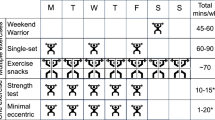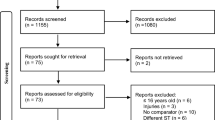Abstract
The aim of this study was to determine the effects of a caffeine-containing energy drink on physical performance during a rugby sevens competition. A second purpose was to investigate the post-competition urinary caffeine concentration derived from the energy drink intake. On two non-consecutive days of a friendly tournament, 16 women from the Spanish National rugby sevens Team (mean age and body mass = 23 ± 2 years and 66 ± 7 kg) ingested 3 mg of caffeine per kg of body mass in the form of an energy drink (Fure®, ProEnergetics) or the same drink without caffeine (placebo). After 60 min for caffeine absorption, participants performed a 15-s maximal jump test, a 6 × 30 m sprint test, and then played three rugby sevens games against another national team. Individual running pace and instantaneous speed during the games were assessed using global positioning satellite (GPS) devices. Urine samples were obtained pre and post-competition. In comparison to the placebo, the ingestion of the energy drink increased muscle power output during the jump series (23.5 ± 10.1 vs. 25.6 ± 11.8 kW, P = 0.05), running pace during the games (87.5 ± 8.3 vs. 95.4 ± 12.7 m/min, P < 0.05), and pace at sprint velocity (4.6 ± 3.3 vs. 6.1 ± 3.4 m/min, P < 0.05). However, the energy drink did not affect maximal running speed during the repeated sprint test (25.0 ± 1.5 vs. 25.0 ± 1.7 km/h). The ingestion of the energy drink resulted in a higher post-competition urine caffeine concentration than the placebo (3.3 ± 0.7 vs. 0.2 ± 0.1 μg/mL; P < 0.05). In summary, 3 mg/kg of caffeine in the form of a commercially available energy drink considerably enhanced physical performance during a women’s rugby sevens competition.



Similar content being viewed by others
References
Astorino TA, Matera AJ, Basinger J, Evans M, Schurman T, Marquez R (2011) Effects of red bull energy drink on repeated sprint performance in women athletes. Amino Acids 42(5):1803–1808. doi:10.1007/s00726-011-0900-8
Barbero-Álvarez JC, Coutts A, Granda J, Barbero-Álvarez V, Castagna C (2009) The validity and reliability of a global positioning satellite system device to assess speed and repeated sprint ability (RSA) in athletes. J Sci Med Sport 13(2):232–235
Bishop D, Girard O, Mendez-Villanueva A (2011) Repeated-sprint ability—part II: recommendations for training. Sports Med 41(9):741–756. doi:10.2165/11590560-000000000-00000
Carr A, Dawson B, Schneiker K, Goodman C, Lay B (2008) Effect of caffeine supplementation on repeated sprint running performance. J Sports Med Phys Fit 48(4):472–478
Coso J, Estevez E, Mora-Rodriguez R (2008) Caffeine effects on short-term performance during prolonged exercise in the heat. Med Sci Sports Exerc 40(4):744–751
Costill DL, Dalsky GP, Fink WJ (1978) Effects of caffeine ingestion on metabolism and exercise performance. Med Sci Sports 10(3):155–158
Coughlan GF, Green BS, Pook PT, Toolan E, O’Connor SP (2011) Physical game demands in elite rugby union: a global positioning system analysis and possible implications for rehabilitation. J Orthop Sports Phys Ther 41(8):600–605. doi:10.2519/jospt.2011.3508
Coutts AJ, Duffield R (2010) Validity and reliability of GPS devices for measuring movement demands of team sports. J Sci Med Sport 13(1):133–135. doi:10.1016/j.jsams.2008.09.015
Cunniffe B, Proctor W, Baker JS, Davies B (2009) An evaluation of the physiological demands of elite rugby union using Global Positioning System tracking software. J Strength Cond Res 23(4):1195–1203. doi:10.1519/JSC.0b013e3181a3928b
Davis JM, Zhao Z, Stock HS, Mehl KA, Buggy J, Hand GA (2003) Central nervous system effects of caffeine and adenosine on fatigue. Am J Physiol Regul Integr Comp Physiol 284(2):R399–R404. doi:10.1152/ajpregu.00386.2002
Del Coso J, Munoz G, Munoz-Guerra J (2011) Prevalence of caffeine use in elite athletes following its removal from the World Anti-Doping Agency list of banned substances. Appl Physiol Nutr Metab 36(4):555–561. doi:10.1139/h11-052
Del Coso J, Munoz-Fernandez VE, Munoz G, Fernandez-Elias VE, Ortega JF, Hamouti N, Barbero JC, Munoz-Guerra J (2012a) Effects of a caffeine-containing energy drink on simulated soccer performance. PLoS ONE 7(2):e31380. doi:10.1371/journal.pone.0031380
Del Coso J, Ramirez JA, Muñoz G, Portillo J, Gonzalez-Millan C, Muñoz V, Barbero JC, Muñoz-Guerra J (2012b) The ingestion of an energy drink improves performance during a simulated rugby game. Appl Physiol Nutr Metab. http://www.nrcresearchpress.com/doi/abs/10.1139/apnm-2012-0339
Del Coso J, Salinero JJ, Gonzalez-Millan C, Abian-Vicen J, Perez-Gonzalez B (2012c) Dose response effects of a caffeine-containing energy drink on muscle performance: a repeated measures design. J Int Soc Sports Nutr 9(1):21. doi:10.1186/1550-2783-9-21
Engebretsen L, Steffen K (2010) Rugby in Rio in 2016! Br J Sports Med 44(3):157. doi:10.1136/bjsm.2010.71555
Froiland K, Koszewski W, Hingst J, Kopecky L (2004) Nutritional supplement use among college athletes and their sources of information. Int J Sport Nutr Exerc Metab 14(1):104–120
Gant N, Ali A, Foskett A (2010) The influence of caffeine and carbohydrate coingestion on simulated soccer performance. Int J Sport Nutr Exerc Metab 20(3):191–197
Glaister M, Howatson G, Abraham CS, Lockey RA, Goodwin JE, Foley P, McInnes G (2008) Caffeine supplementation and multiple sprint running performance. Med Sci Sports Exerc 40(10):1835–1840
Graham TE, Helge JW, MacLean DA, Kiens B, Richter EA (2000) Caffeine ingestion does not alter carbohydrate or fat metabolism in human skeletal muscle during exercise. J Physiol 529(Pt 3):837–847
Higham DG, Pyne DB, Anson JM, Eddy A (2012) Movement patterns in rugby sevens: effects of tournament level, fatigue and substitute players. J Sci Med Sport 15(3):277–282. doi:10.1016/j.jsams.2011.11.256
Jennings D, Cormack S, Coutts AJ, Boyd LJ, Aughey RJ (2010) Variability of GPS units for measuring distance in team sport movements. Int J Sports Physiol Perform 5(4):565–569
King T, Jenkins D, Gabbett T (2009) A time-motion analysis of professional rugby league match-play. J Sports Sci 27(3):213–219. doi:10.1080/02640410802538168
Kristiansen M, Levy-Milne R, Barr S, Flint A (2005) Dietary supplement use by varsity athletes at a Canadian university. Int J Sport Nutr Exerc Metab 15(2):195–210
Lelo A, Miners JO, Robson RA, Birkett DJ (1986) Quantitative assessment of caffeine partial clearances in man. Br J Clin Pharmacol 22:183–186
Lopez V Jr, Galano GJ, Black CM, Gupta AT, James DE, Kelleher KM, Allen AA (2012) Profile of an American amateur rugby union sevens series. Am J Sports Med 40(1):179–184. doi:10.1177/0363546511427124
Magkos F, Kavouras SA (2005) Caffeine use in sports, pharmacokinetics in man, and cellular mechanisms of action. Crit Rev Food Sci Nutr 45(7–8):535–562
McLellan CP, Lovell DI, Gass GC (2011) Performance analysis of elite Rugby League match play using global positioning systems. J Strength Cond Res 25(6):1703–1710. doi:10.1519/JSC.0b013e3181ddf678
Rienzi E, Reilly T, Malkin C (1999) Investigation of anthropometric and work-rate profiles of Rugby Sevens players. J Sports Med Phys Fit 39(2):160–164
Roberts SP, Trewartha G, Higgitt RJ, El-Abd J, Stokes KA (2008) The physical demands of elite English rugby union. J Sports Sci 26(8):825–833. doi:10.1080/02640410801942122
Stuart GR, Hopkins WG, Cook C, Cairns SP (2005) Multiple effects of caffeine on simulated high-intensity team-sport performance. Med Sci Sports Exerc 37(11):1998–2005
Suarez-Arrones L, Nunez F, Portillo J, Mendez-Villanueva A (2011a) Match running performance and exercise intensity in elite female Rugby Sevens. J Strength Cond Res 26(7):1858–1862. doi:10.1519/JSC.0b013e318238ea3e
Suarez-Arrones LJ, Nunez FJ, Portillo J, Mendez-Villanueva A (2011b) Running demands and heart rate responses in men Rugby Sevens. J Strength Cond Res. doi:10.1519/JSC.0b013e318243fff7
Acknowledgments
The authors wish to thank the rugby players of the Spanish National Team for their invaluable contribution to the study. In addition, we are very grateful to the Spanish Rugby Federation for its involvement in this investigation. This investigation was awarded with the Ayudas a la Investigación, from Camilo José Cela University
Conflict of interest
The authors declare that they have no conflict of interest.
Author information
Authors and Affiliations
Corresponding author
Rights and permissions
About this article
Cite this article
Del Coso, J., Portillo, J., Muñoz, G. et al. Caffeine-containing energy drink improves sprint performance during an international rugby sevens competition. Amino Acids 44, 1511–1519 (2013). https://doi.org/10.1007/s00726-013-1473-5
Received:
Accepted:
Published:
Issue Date:
DOI: https://doi.org/10.1007/s00726-013-1473-5




